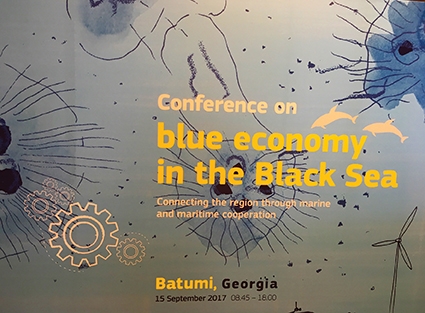Fishing in Troubled Waters: The 4th Black Sea Stakeholder Conference
On September 15, at the Radisson Blu Hotel in Batumi, the 4th Black Sea Stakeholder Conference took place, covering issues of blue economy, maritime careers, the role of governments in maritime integration and general marine knowledge.
Participants from 20 European countries were greeted by Konstantine Megrelishvili, Minister of Finance and Economy of Adjara, and Giorgi Cherkezishvili, Minister of Economy and Sustainable Development of Georgia.
Cherkezishvili recalled the national motto of Georgia, “Power is in Unity,” highlighting the importance of collaboration for developing the blue economy in the Black Sea region.
“Collective action is the only effective action,” agreed Karmenu Vella, the Commissioner of Environment, Maritime Affairs and Fisheries, going on to assert that the European Union is serious about resolving current issues in the Black Sea, for which purpose it has already signed to provide EUR 1 million of financial help.
Berhnard Friess, EU Commissioner of Maritime Affairs, in his talk highlighted that sustainable economic growth is directly related to environmental protection: “The more you take care of the sea, the greater benefit it gives you back,” he said.
In order to provide a positive example of development, experts of maritime planning from the Baltic Sea Region were invited to speak at the conference.
From Sweden, where both government and opposition agreed to pledge on protecting the marine environment together, Dr. Ingela Isaksson, the Swedish Agency of Marine and Water Management, introduced the audience to the concept of the “wedding cake” system which was developed by Sweden in order to effectively plan its marine territories. “Our wedding cake is built from the Biosphere, Society, Economy and Collaboration, which sits at the top. All the components are essential, and if you eat too much of one, the others will be damaged, and the cake will collapse,” Isaksson said with a smile.
However, not all expert presentations amused the audience. A speech made by Andrei Loppo, expert on maritime planning of the Russian State Duma, raised a number of questions and concerns.
“Although Russia decided to mark its water borders, the initiative was unsuccessful,” he said. “All countries in this region have their own views regarding the state borders, so Russia faced difficulties in terms of forming connections in the Baltic”.
He then told the audience that in the Baltic Region, people already realized the sea should connect, not divide, countries; and yet, “Russia-Georgia touristic routes are not as developed as those in the Baltic, and this is the fault of both Russia and Georgia”.
Further to his words, the map he presented caused insurmountable concerns, showing as it did Russian ports, with the Crimean Peninsula included as the part of Russian Federation and Crimean harbors represented as Russian ones. Further, Abkhazia was excluded from other Georgian territory.
None of the EU officials commented, but the Ukrainian delegation’s reaction was swift, calling for respect of Ukraine's territorial integrity.
“The representative of Russia made a sad mistake while presenting his position,” the Ukrainian delegate said. “The Russian occupation of Crimea is a temporary event. Crimea is the legal territory of Ukraine and this is not just the Ukrainian position, as the whole world recognizes this. However, we will be happy to put into practice the experience introduced by Mr. Loppo after the peninsula is returned to our country”. His comment earned a round of applause.
Towards the end of the ceremony, the main points were summarized, with the EU officials explaining to the stakeholders how the European grant system works for applicants who wish to develop the blue economy in the Black Sea region. The same officials also made several promises about future development. Sadly, the Georgian delegation, despite having stated their wish to cooperate with neighboring countries at the very beginning of conference, left soon after the opening remarks without further explaining any concrete plans they had in this direction.
Davit Jintcharadze











